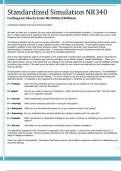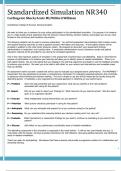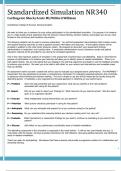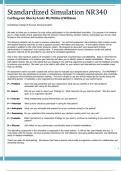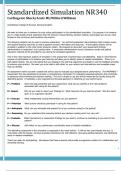Cardiogenic shoc - Study guides, Class notes & Summaries
Looking for the best study guides, study notes and summaries about Cardiogenic shoc? On this page you'll find 58 study documents about Cardiogenic shoc.
Page 4 out of 58 results
Sort by
Standardized Simulation NR340 Cardiogenic ShockAcute MIWilford WillmanStandardized Simulation NR340 Cardiogenic ShockAcute MIWilford Willman
Standardized Simulation NR340 Cardiogenic ShockAcute MIWilford WillmanStandardized Simulation NR340 Cardiogenic ShockAcute MIWilford Willman
Standardized Simulation NR340 Cardiogenic ShockAcute MIWilford Willman.
Standardized Simulation NR340 Cardiogenic ShockAcute MIWilford Willman.
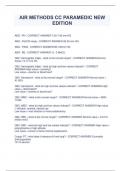
-
AIR METHODS CC PARAMEDIC NEW EDITION
- Exam (elaborations) • 9 pages • 2023
- Available in package deal
-
- $11.99
- + learn more
AIR METHODS CC PARAMEDIC NEW EDITION ABG - PH - CORRECT ANSWER-7.35-7.45 mm HG ABG - PaCO2 range - CORRECT ANSWER-35-45 mm HG ABG - PA02 - CORRECT ANSWER-80-100mm HG ABG - BE - CORRECT ANSWER--2 - 3 MeQ/L CBC: Hemoglobin (Hgb) - what is the normal range? - CORRECT ANSWER-Normal Value: 14-17.5 G /DL CBC: Hemoglobin (Hgb) - what do high and low values indicate? - CORRECT ANSWER-High value = smoking? Low value = anemia or blood loss? CBC: Hematocrit - what is the normal range? - CORRE...
Standardized Simulation NR340 Cardiogenic ShockAcute MIWilford Willman.
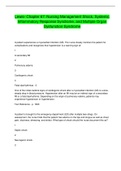
-
Lewis- Chapter 67: Nursing Management Shock, Systemic Inflammatory Response Syndrome, and Multiple Organ Dysfunction Syndrome
- Exam (elaborations) • 61 pages • 2022
-
- $13.49
- + learn more
A patient experiences a myocardial infarction (MI). The nurse closely monitors the patient for complications and recognizes that hypotension is a warning sign of: 1 A secondary MI 2 Pulmonary edema 3 Cardiogenic shock 4 Fatal dysrhythmias - 3 One of the initial cardinal signs of cardiogenic shock after a myocardial infarction (MI) is a slow, steady drop in blood pressure. Hypotension after an MI may be an indirect sign of a secondary MI or a fatal dysrhythmia. Depending on the ori...
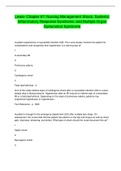
-
Lewis- Chapter 67: Nursing Management Shock, Systemic Inflammatory Response Syndrome, and Multiple Organ Dysfunction Syndrome
- Exam (elaborations) • 61 pages • 2022
- Available in package deal
-
- $13.49
- + learn more
A patient experiences a myocardial infarction (MI). The nurse closely monitors the patient for complications and recognizes that hypotension is a warning sign of: 1 A secondary MI 2 Pulmonary edema 3 Cardiogenic shock 4 Fatal dysrhythmias - 3 One of the initial cardinal signs of cardiogenic shock after a myocardial infarction (MI) is a slow, steady drop in blood pressure. Hypotension after an MI may be an indirect sign of a secondary MI or a fatal dysrhythmia. Depending on the ori...
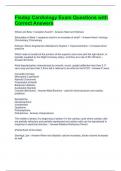
-
Fisdap Cardiology Exam Questions with Correct Answers
- Exam (elaborations) • 8 pages • 2024
-
Available in package deal
-
- $11.49
- + learn more
Fisdap Cardiology Exam Questions with Correct Answers Principle symptom of Coronary Artery Disease or Acute Coronary Syndrome that occurs when supply of O2 is to the myocardium is insufficient to meet demand and cells become ischemic? - Answer-Angina Pectoris Chest pain that occurs at rest and is caused by coronary artery vasospasm? Risk for Dysrhythmia, MI, Heart Block and Death - Answer-Prinzmetal Angina (PA) Which electrolyte flows into cardiac cells to initiate depolarization? - Ans...
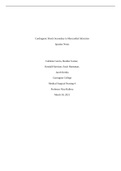
-
MED SURG 263 - Cardiogenic Shock Secondary to Myocardial Infarction - Speaker Notes
- Other • 12 pages • 2022
-
- $8.49
- + learn more
Introduction (Slide 2) Cardiogenic shock is a form of acute heart failure and it is the most deadly. Cardiogenic shock is caused by the following severe arrhythmias, heart inflammation, infection, MI, pericardial tamponade (Temple health, 2021). Cardiogenic shock can also be caused by a drug overdose or poisoning (Lewis, et al., 2017) (Mehrpour, et al., 2019). Cardiogenic shock usually happens when someone presents with a myocardial infarction that had not been treated right away. The clie...

Did you know that on average a seller on Stuvia earns $82 per month selling study resources? Hmm, hint, hint. Discover all about earning on Stuvia

